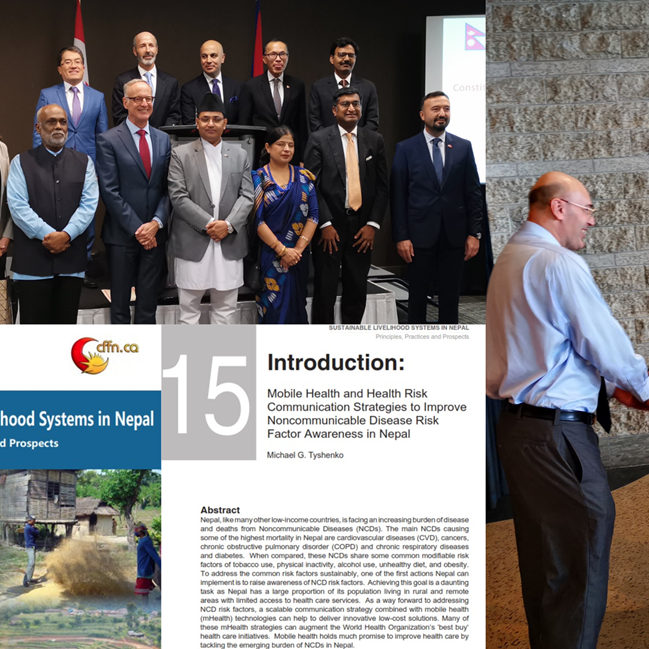
Michael G. Tyshenko
Senior Health Risk Analyst
Joined RSI in 2018
- Accomplished research scientist in molecular and cellular biology
- McLaughlin Chair recipient, University of Ottawa (5-year endowed position)
- Interdisciplinary training in Public Health and Administration (Queen's University, MPA)
- International health policy teaching experience in China and Latin America
- Over 100 peer review publications, 12 book chapters and 2 books
Dr. Michael G. Tyshenko is a Senior Health Risk Analyst at Risk Sciences International (RSI), where he has contributed since 2018 to some of the organization’s most complex and cross-cutting public health risk projects. As RSI’s lead on chemical peer reviews, he brings extensive experience in regulatory science, biological risk, and science-policy integration to high-stakes evaluations that require both deep expertise and clear communication.
Dr. Tyshenko’s research and collaborations span pandemic preparedness, emerging infectious diseases, and global risk policy, with applied work on SARS, MERS, and COVID-19. His current projects include policy analysis for the World Health Organization’s Global Technical Strategy for Malaria 2016–2030, identifying barriers to malaria reduction targets in Sub-Saharan African countries; ongoing collaboration with Nepal’s Ministry of Health on mobile and e-health approaches for remote populations; and ecological climate modeling with partners in Egypt and Saudi Arabia to project how climate change may alter pest distributions affecting biodiversity and crop productivity—providing insights for adaptive management and agricultural resilience.
Drawing on more than two decades of experience at the intersection of risk science, epidemiology, and public health policy, Dr. Tyshenko is recognized for advancing interdisciplinary approaches to health risk evaluation and for bridging scientific evidence with actionable policy.
Pre-RSI
Dr. Tyshenko’s career has consistently bridged the life sciences, public health, and public administration. He holds a Ph.D. and M.Sc. in Biology from Queen’s University, completed postdoctoral training in Public Health at the University of Ottawa, and earned a second master’s degree—a Master of Public Administration—also from Queen’s. This rare combination of scientific and governance-focused training underpins his distinctive contributions to health risk analysis and policy engagement.
From 2009 to 2013, Dr. Tyshenko held the McLaughlin Chair in Biological Risk Assessment at the University of Ottawa, where he led both academic research and applied science-policy translation. During this time, he developed and delivered Johns Hopkins–style short courses in public health across China through a five-year collaborative university–government initiative, and completed a parallel two-year project in Costa Rica, partnering with local and national authorities to identify public health policy gaps and capacity needs.
His leadership extended to the digital realm as Scientific Director of Risk.com, a knowledge portal providing curated summaries of global health hazards. Over the course of his career, Dr. Tyshenko has authored more than 100 peer-reviewed articles, 12 book chapters, and two books—cementing his reputation as a versatile thinker capable of bridging scientific disciplines and policy environments.
Celebrating Nepal’s Constitution Day with Mr. Bhrigu Dhungana, Nepal’s ambassador to Canada. Our work on sustainability in Nepal resulted in the IUCN sponsored book, Sustainable Livelihood Systems in Nepal where I acted and the English copy editor and contributor. A second project involved needs assessments for expanding mountain tourism in Nepal. (Sept. 19, 2022).
Case studies associated with Michael G. Tyshenko
Publications associated with Michael G. Tyshenko
Multi-jurisdictional expert opinion for improving children’s environmental health protection.
The impact of social amplification and attenuation of risk and the public reaction to mad cow disease in Canada.
Prionet Canada: a network of centres of excellence for research into prions and prion diseases.
Risk communication of endocrine-disrupting chemicals: improving knowledge translation and transfer.
Locust retinoid X receptors: 9-Cis-retinoic acid in embryos from a primitive insect.
Men having sex with men donor deferral risk assessment: an analysis using risk management principles.
Bovine spongiform encephalopathy and the safety of milk from Canadian dairy cattle.
Transcription of antifreeze protein genes in Choristoneura fumiferana.
Search all publications
Expert editorials associated with Michael G. Tyshenko
Outside RSI
Beyond his professional life, Dr. Tyshenko is a dedicated and accomplished triathlete, with over 100 Olympic-distance triathlons, multiple Half-Ironman races, and three Ironman completions to his name. He has represented Canada as an age-group athlete at the World Triathlon Championships in Deerhurst, later transitioning to longer endurance formats that echo the persistence and discipline he brings to his scientific work.
Dr. Tyshenko’s approach to public health is fundamentally holistic—integrating molecular biology, risk communication, ethics, and evidence-based policymaking. His athletic discipline, global perspective, and interdisciplinary fluency make him a valued contributor to RSI’s mission to understand, manage, and communicate health risks in a rapidly changing world.

































